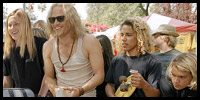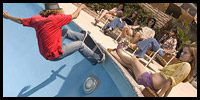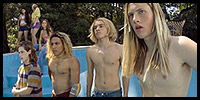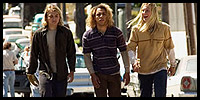
 |
|
Lords of Dogtown (2005) Cast: Emile Hirsch, John Robinson, Victor Rasuk, Michael Angarano, Heath Ledger, Nikki Reed, Johnny Knoxville, Rebecca De Mornay, Elden Henson, Vincent Laresca, William Mapother, America Ferrarra, Sofia Vergara, Pablo Schreiber, Matt Malloy, Steve Badillo, Eddie Cahill, Melonie Diaz, Alexis Arquette, Bai Ling, Tony Hawk, Stacy Peralta 2005 – 107 minutes Rated: Reviewed by Dustin Putman, May 18, 2005.  A dramatic retelling of 2001's documentary, "Dogtown and Z-Boys," "Lords of Dogtown" recounts the true story of a group of aimless Venice, California, teens in the mid-1970s, labeled the Z-Boys, who skyrocket to stardom amidst the rise of the skateboarding/surfing culture. Injecting this topic with a razor authenticity and spontaneous, "you-are-there" feel are director Catherine Hardwicke (2003's "Thirteen") and screenwriter Stacy Peralta. Peralta, especially, knows his way around the topic at hand, and for good reason; he was one of the Z-Boys himself, who turned his fame into a successful filmmaking career of his own.
A dramatic retelling of 2001's documentary, "Dogtown and Z-Boys," "Lords of Dogtown" recounts the true story of a group of aimless Venice, California, teens in the mid-1970s, labeled the Z-Boys, who skyrocket to stardom amidst the rise of the skateboarding/surfing culture. Injecting this topic with a razor authenticity and spontaneous, "you-are-there" feel are director Catherine Hardwicke (2003's "Thirteen") and screenwriter Stacy Peralta. Peralta, especially, knows his way around the topic at hand, and for good reason; he was one of the Z-Boys himself, who turned his fame into a successful filmmaking career of his own.
 While Stacy Peralta (John Robinson) garners well-deserved recognition as he starts attending skateboarding championships, he does it on his own, looking from the outside in when all of his friends—troubled talent Jay Adams (Emile Hirsch), cocksure Tony Alva (Victor Rasuk), and easygoing Sid (Michael Angarano)—are taken under the wing of surf shop owner/mentor Skip Engblom (Heath Ledger). Stacy has a job and goals outside of skateboarding, which he nonetheless is very, very good at, and is instantly viewed by Skip as not being Z-Boy material because of it. Through Skip's leadership, the others also rise to the top. As the four of them begin getting endorsement deals and management offers from all different directions, however, it threatens to tear their friendship—and Skip's own dreams of fame and fortune—apart before their sports career has hardly even begun.
While Stacy Peralta (John Robinson) garners well-deserved recognition as he starts attending skateboarding championships, he does it on his own, looking from the outside in when all of his friends—troubled talent Jay Adams (Emile Hirsch), cocksure Tony Alva (Victor Rasuk), and easygoing Sid (Michael Angarano)—are taken under the wing of surf shop owner/mentor Skip Engblom (Heath Ledger). Stacy has a job and goals outside of skateboarding, which he nonetheless is very, very good at, and is instantly viewed by Skip as not being Z-Boy material because of it. Through Skip's leadership, the others also rise to the top. As the four of them begin getting endorsement deals and management offers from all different directions, however, it threatens to tear their friendship—and Skip's own dreams of fame and fortune—apart before their sports career has hardly even begun.
 In the free-floating, improvisational style with which director Catherine Hardwicke tackles "Lords of Dogtown," the film reminds of 1997's "Boogie Nights," with skateboarding replacing the world of pornography. There is no clear-cut narrative, no false crises, no dumbed-down plot turns, and not a hint of condescension; instead, Hardwicke and screenwriter Peralta embroil the viewer into the lives of its characters as it pertains to a skateboarding hobby that blossoms into burgeoning careers and more opportunities and responsibilities than they are perhaps ready to handle. Meanwhile, people and their personal relationships shift in and out of focus as they do in real life.
In the free-floating, improvisational style with which director Catherine Hardwicke tackles "Lords of Dogtown," the film reminds of 1997's "Boogie Nights," with skateboarding replacing the world of pornography. There is no clear-cut narrative, no false crises, no dumbed-down plot turns, and not a hint of condescension; instead, Hardwicke and screenwriter Peralta embroil the viewer into the lives of its characters as it pertains to a skateboarding hobby that blossoms into burgeoning careers and more opportunities and responsibilities than they are perhaps ready to handle. Meanwhile, people and their personal relationships shift in and out of focus as they do in real life.
 Holding this ultra-realistic format back just a bit, but to no calamitous outcome, is a PG-13 rating—an R would have been more appropriate for the hard-edged lives on display—and a too-short running time of 107 minutes that abbreviates the events more than it should have. The teenage characters do not seem to have lives outside of skateboarding, or, at least, are rarely glimpsed beyond this arena. This may be part of the point—at this particular time and place, skateboarding was their whole lives—but it might have helped to see them go to school, interact more with their families, and explore their personal interiors to a more thorough degree. When a subtitle comes up at one point that says the time period has spanned over a year in roughly twenty minutes, it is jarring, leading one to wonder what happened in the sizable space between.
Holding this ultra-realistic format back just a bit, but to no calamitous outcome, is a PG-13 rating—an R would have been more appropriate for the hard-edged lives on display—and a too-short running time of 107 minutes that abbreviates the events more than it should have. The teenage characters do not seem to have lives outside of skateboarding, or, at least, are rarely glimpsed beyond this arena. This may be part of the point—at this particular time and place, skateboarding was their whole lives—but it might have helped to see them go to school, interact more with their families, and explore their personal interiors to a more thorough degree. When a subtitle comes up at one point that says the time period has spanned over a year in roughly twenty minutes, it is jarring, leading one to wonder what happened in the sizable space between.
 Minor inconsistencies and downfalls aside, "Lords of Dogtown" is an enthralling, dynamic motion picture, getting just right the touchy friendships that only boys of around sixteen can share, and with a number of rousingly choreographed skateboarding sequences that, more often than not, really look like the actors doing their own stunts. This minimum of seeming deception blesses the film with a further realism and verve. So does the precise and knowledgeable '70s flavoring fitted around the edges of the story, from the costumes to production design to marvelously chosen and effectively edited soundtrack of practically wall-to-wall period songs. This is one instance where music is not used to sell albums, or as an act of desperation to add interest to a faltering script, but actually enhances and contextualized the tale being told.
Minor inconsistencies and downfalls aside, "Lords of Dogtown" is an enthralling, dynamic motion picture, getting just right the touchy friendships that only boys of around sixteen can share, and with a number of rousingly choreographed skateboarding sequences that, more often than not, really look like the actors doing their own stunts. This minimum of seeming deception blesses the film with a further realism and verve. So does the precise and knowledgeable '70s flavoring fitted around the edges of the story, from the costumes to production design to marvelously chosen and effectively edited soundtrack of practically wall-to-wall period songs. This is one instance where music is not used to sell albums, or as an act of desperation to add interest to a faltering script, but actually enhances and contextualized the tale being told.
 The performances are unanimously strong, with the actors disappearing into their roles (and most made to look like dead ringers for their non-fiction counterparts) and freeing themselves of affected movieisms. With the appropriately fluid handheld camerawork by cinematographer Elliot Davis (2004's "A Love Song for Bobby Long"), naturalistic dialogue, and loose performances, "Lords of Dogtown" frequently resembles a documentary itself. As the semi-outsider of the group, Stacy Peralta, virtual newcomer John Robinson (2003's unforgettable "Elephant") is effortless and charismatic, paving the way for an undeniable future ahead of him in film. Emile Hirsch (2004's "The Girl Next Door") is both poignant and intentionally frustrating as Jay Adams, whose daredevil actions are a way of dealing with a father (William Mapother) who has abandoned him and a downtrodden mother (a dressed-down, nearly unrecognizable Rebecca De Mornay) whose problems, one suspects, burrow much further underneath the surface of what this production has time to develop. Finally, Michael Angarano (2000's "Almost Famous") is an eye-opener, funny and true, as Sid, whose less studly, more spectator-like character is the film's most charming and easily identifiable. In key supporting roles, Heath Ledger (2002's "Monster's Ball") is quietly tragic as Skip, whose naive hopes for the future are more idealistic than what the reality holds for him, and Nikki Reed (2003's "Thirteen") is solid, if underutilized, as Kathy, the flirtatious sister of Tony who has eyes on Stacy.
The performances are unanimously strong, with the actors disappearing into their roles (and most made to look like dead ringers for their non-fiction counterparts) and freeing themselves of affected movieisms. With the appropriately fluid handheld camerawork by cinematographer Elliot Davis (2004's "A Love Song for Bobby Long"), naturalistic dialogue, and loose performances, "Lords of Dogtown" frequently resembles a documentary itself. As the semi-outsider of the group, Stacy Peralta, virtual newcomer John Robinson (2003's unforgettable "Elephant") is effortless and charismatic, paving the way for an undeniable future ahead of him in film. Emile Hirsch (2004's "The Girl Next Door") is both poignant and intentionally frustrating as Jay Adams, whose daredevil actions are a way of dealing with a father (William Mapother) who has abandoned him and a downtrodden mother (a dressed-down, nearly unrecognizable Rebecca De Mornay) whose problems, one suspects, burrow much further underneath the surface of what this production has time to develop. Finally, Michael Angarano (2000's "Almost Famous") is an eye-opener, funny and true, as Sid, whose less studly, more spectator-like character is the film's most charming and easily identifiable. In key supporting roles, Heath Ledger (2002's "Monster's Ball") is quietly tragic as Skip, whose naive hopes for the future are more idealistic than what the reality holds for him, and Nikki Reed (2003's "Thirteen") is solid, if underutilized, as Kathy, the flirtatious sister of Tony who has eyes on Stacy.
 "Lords of Dogtown" isn't chock-full of big, flashy events, and doesn't need to be. Its subject matter, and the unglamorized, fascinating figures on display, are more than enough to carry the film throughout. Entertaining in its joy and energy, and perceptive in depicting a specific, one-of-a-kind era, "Lords of Dogtown" is an intoxicating look at a topic that even audiences not familiar with it walking in will walk out feeling as if they have gotten to live the life, or at least breathed the air for two hours, of an influential counterculture forever frozen in time.
"Lords of Dogtown" isn't chock-full of big, flashy events, and doesn't need to be. Its subject matter, and the unglamorized, fascinating figures on display, are more than enough to carry the film throughout. Entertaining in its joy and energy, and perceptive in depicting a specific, one-of-a-kind era, "Lords of Dogtown" is an intoxicating look at a topic that even audiences not familiar with it walking in will walk out feeling as if they have gotten to live the life, or at least breathed the air for two hours, of an influential counterculture forever frozen in time.
|
© 2008 by Dustin Putman |














